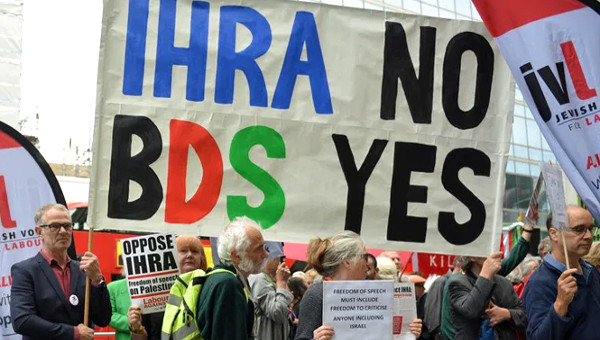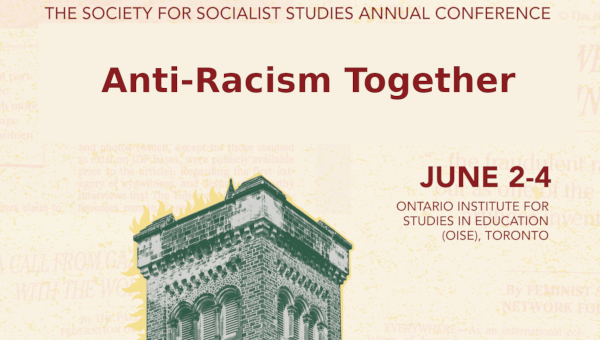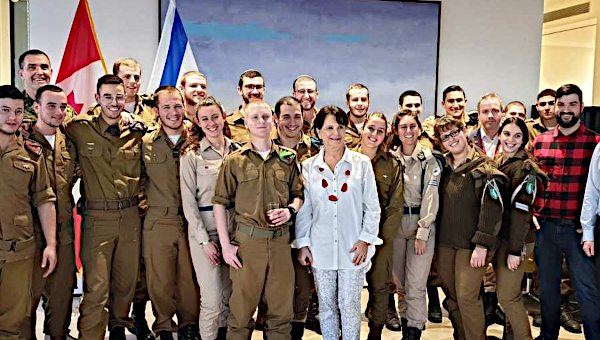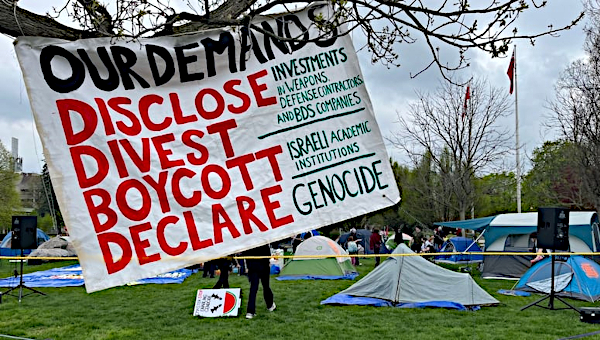Debating the IHRA and Anti-Semitism: Why the CIJA Lost
For more than five years, and on numerous occasions, the Jewish anti-racist social justice organization Independent Jewish Voices Canada (IJV) invited the Centre for Israel and Jewish Affairs (CIJA) – Canada’s pro-Israel advocacy group – to a public debate. But the latter rebuffed each of IJV’s overtures.1 In recoiling consistently before the prospect of a confrontation with IJV, CIJA must have feared that in accepting to take up the challenge, its pro-Israel apologetics might be undermined. To engage directly with IJV would have meant yielding discursive space to dissenting Jewish voices, and opening itself up to some less-than-flattering public exposure. At worst, CIJA’s talking points would be revealed for what they are: i.e., well-rehearsed fictions or nursery tales, refurbished for adult ears. At best, they would not persuade.
Israel’s longstanding occupation of Palestine, its merciless blockade of the Gaza strip, and not least its brutal Operation Protective Edge (2014) that slaughtered 100 Gazans per day over 4 weeks, had caused a shift in international public opinion – from the romantic vision of Israel as a glorious miracle to the sordid reality of its settler colonialism. Defending the indefensible would not be easy for CIJA. For the fledgling IJV was, already at the time of Operation Protective Edge, steadily garnering public consent and legitimacy within Canada. Arguably, it could triumph over CIJA on the public stage. (Shades of the slight David outsmarting Goliath come to mind.)
CIJA’s defeat was indeed the outcome of a virtual debate hosted by the Ryerson Centre for Free Expression on June 10, 2020 in which it finally faced off against IJV on the topic of the International Holocaust Remembrance Alliance’s Working Definition of anti-Semitism (IHRA-WDA): i.e., on whether this definition serves to combat anti-Semitism or whether its aim is to stifle criticism of the State of Israel. The contending parties included IJV spokesperson Dr. Sheryl Nestel and Osgoode Hall law Professor Faisal Bhabha who denounced the IHRA definition, deeming it a cudgel of censorship, and Richard Marceau, Vice-President of CIJA, and Bernie Farber, former President of the Canadian Jewish Congress, who argued in favour of it.
I
A number of indicators might serve to measure CIJA’s defeat, but perhaps the clearest of all is the two-tiered reaction to Professor Faisal Bhabha for a statement he made in the course of an exchange with Bernie Farber. Arguing quite matter-of-factly and with utmost aplomb, Professor Bhabha opined that Zionism is fundamentally about Jewish Supremacy, not self-determination. What did he mean by this? He explained (time 34:46 – 35:11):
“I am describing what I understand Zionism to be as an idea and as a practice, which is the suppression of Palestinian human rights for the purpose of ensuring Jewish supremacy, and it is exactly what is being protested against today in the United States against white supremacy… I am equating white supremacy with Jewish supremacy. I think both are equally morally repugnant and deserve to be called out and spoken against.”
Upon hearing this, both Bernie Farber and Richard Marceau were left tongue-tied, unable to counter Professor Bhabha’s claim. When Sheryl Nestel weighed in, pointing to the “Jewish” Nation-State law as an instance of supremacy, Richard Marceau veered off topic with a classic “what aboutery,” in other words, with a red herring.2 Digressing from the central subject of discussion (i.e., the racist nature of Israel’s nation-state law), Marceau turned the audience’s attention to the Palestinian Basic Law in order to establish an equation between Israel and Palestine. But the comparison offered was flawed, since the Palestinian Basic Law is merely an aspirational constitution in the absence of a veritable Palestinian state while Israel’s nation-state law is an enshrined statute in an actually existing state. By focussing on these lesser known questions, Marceau produced a distraction that essentially blocked discussion of the racist nature of the Israeli state.
The moderator soon brought the exchange to a close. In the end, Professor Bhabha’s statement was never refuted. It was simply met with Richard Marceau’s distracting digression and Bernie Farber’s consternation.
But why did Professor Bhabha’s statements provoke such dismay? Why did Richard Marceau cringe upon hearing this? And why did Bernie Farber feel the impact of Bhabha’s words so viscerally? One can only assume that the word “supremacy” acted as a trigger for these two panelists. For them, the equation of “Jewish supremacy” with white supremacy must have conjured thoughts of Nazism. And yet, “supremacy,” simply means domination: i.e., “the state or condition of being [or acting] superior to others, through positions of authority, power, or status.”
But just as the pro-IHRA panelists appeared unable to dissociate white supremacy from recollections of Neo-Nazism and 20th-century German Nazism, so they could not discern any trace of supremacy in Zionism itself. They appeared blind to the flagrant racial domination embodied in countless Israeli state laws, and not least in the recently enacted nation-state law, which defines the State of Israel as the nation-state of the Jewish people and treats 20 per cent of its population (i.e., the non-Jewish part) as second-class citizens.
When the state of Israel accords full democratic rights to its Jewish population but denies the non-Jewish population these same rights, is this not objectively speaking a form of ethnic/racial supremacy? When the Nation-State Law enshrines democratic rights for some, while depriving one fifth of its 9 million citizens these same rights, is the Zionist state not making manifest its specifically Jewish supremacy? “Jewish identity” is then deployed as the ethnically charged political tool to separate the “wheat” from the “chaff,” as it were. Seen thus, “supremacy” is the objective descriptor for the self-assigned superiority of one societal group over another. In the state of Israel, the specific type of supremacy happens to be “Jewish” – not because all Jews regard themselves as superior human beings, but because the Nation-State law establishes this idea by fiat. Together, then, the two words add up to what Professor Bhabha calls “Jewish supremacy.”
II
So why were Bernie Farber and Richard so startled by Professor Bhabha’s stated views? Perhaps because they experienced a certain “Zionist” fragility (Farber said in response that it ‘curdled [his] innards’) in confronting the darker (read racist) side of Zionism, such as the ethnic-cleansing that was part of the formation of the Israeli state and continues to define its colonial policies of occupation. Perhaps these two panelists required more time to digest this unpleasant truth. But in the heat of the exchange, they could not effectively refute Professor Bhabha’s argument. They had no compelling counterpoint to offer.3
If reaction to Professor Bhabha’s remarks within the debate was halting and feeble, the response to it from outside the debate was aggressive and hasty. It took little or no time – some days at most – for B’nai Brith to flex its muscle and drag the statement out into the street, just as Achilles dragged the heroic Hector on the ground with senseless cruelty. In so doing, the pro-Israel lobby bastardized the true intent of the professor’s statement, prising it from its context, and smearing it.4 As if to rescue CIJA from public shame, B’nai Brith sought to disgrace the Osgoode Hall law professor by petitioning (nay, pressuring) the president of York University, Rhonda Lenton, to discipline him.
Was B’nai Brith summoned by CIJA to offer this extravagant reinforcement or did B’nai Brith intervene unsolicited as a deus ex machina to salvage the wreckage that the CIJA spokespersons had left in their wake? Either way, the attack on Professor Bhabha confirmed his stated point (and this despite accusations of fear-mongering leveled at him by Bernie Farber and Richard Marceau) “that the IHRA definition is dangerous if adopted into law or policy, especially on university campuses, because it would result in the suppression of free speech, the demonisation of Palestinian human rights defenders, and the spread of Islamophobia.”5
Whether taken as an official guideline or as the voice of Zionist common sense, the IHRA-DWA can and will be invoked to forbid anyone, on penalty of vilification, from naming Israel a racist state – even as a plethora of evidence shows that the Zionist colonizing agenda rests on a dehumanizing treatment of Palestinians, on an ongoing history of ethnic cleansing. The IHRA-WDA is indeed a dangerous document; its repressive force can be readily applied with or without a legal stamp. Its deceptively innocent, confused, and thus treacherous examples of anti-Semitism are in fact prohibitions and veiled threats against free speech, masquerading as educational guidelines. So while it has not been enacted as law in Canada, the dominant discourses surrounding the IHRA-WDA, and the organizations that have collaborated to enshrine it, have granted the Israel Lobby justification to apply it avant la lettre.
Nor will the IHRA-WDA eliminate anti-Semitism. In fact, it threatens to further anti-Semitism by incorporating in its definition racist stereotypes of Jews. Such stereotypes would simply fuel anti-Semitic hatred among the Alt-Right communities. In addition, the IHRA-WDA would target the outspoken anti-Zionist critic. It would act as a green light, an order from “above,” to incite mob anger against those who are openly critical of the Zionist state. Professor Bhabha would be one of these targets. He thus argues (time 35:12–35:27) that the reason [he] oppose[s] the IHRA definition is because … “it turns [him] into an anti-Semite for expressing statements of solidarity with formerly colonized and currently colonized people of the world.”
Considered in hindsight, B’nai Brith’s use of “heavy artillery” against Professor Bhabha suggests that CIJA left the debate in a weakened state, unable to defend its position independently of some external reinforcement. But even the B’nai Brith could not rescue CIJA from its defeat; it thus resorted to violating Professor Bhabha’s professional integrity.
III
Aggressive political conduct is not restricted to the deeds of lobby groups; it is also discernible in modes of speech, in the particular political discourse wielded by advocacy groups. Those who have lost, or are poised on losing an argument, resort to slurs, ad hominems and patronizing put-downs. This was patently obvious in the IHRA debate (at 44:31-45:03) when Richard Marceau engaged in mansplaining Sheryl Nestel.6 As the debate drew to a close, his sanctimonious rhetoric intensified and his reactions to Sheryl Nestel’s arguments waxed supercilious and particularly demeaning. His remarks suggested that Sheryl Nestel and her organization, IJV, are not “real” Jews, do not feel the horror of anti-Semitism, and ought to be dismissed.7 These inferences amounted to a racist slur. But for all this, Richard Marceau could not unsettle Sheryl Nestel’s dignity and composure. She remained flawless in her adherence to the facts and in her ethical appeal to principles of honest and fair debate.
Some might interpret Richard Marceau’s behaviour as compensatory, as an unseemly substitute for convincing arguments. In the absence of a robust thesis, he resorted to grossly misrepresenting the views of Sheryl Nestel and Professor Bhabha, and lamenting the “mistreatment” of Israel. Dwelling on Jewish suffering, he exploited for rhetorical ends the received notion that “Anti-Semitism is the longest hatred.” His implied meaning, one can only conclude, is that the victimization of Jews is the most significant in the world, standing apart from all other hatreds as an enduring and absolute victimhood. In the context of the IHRA-WDA debate, Richard Marceau’s use of this phrase only served to exceptionalize anti-Semitism as the ultimate racism; and the result of this distinction is nothing short of racism itself. For tacitly it privileges Jewish pain over the pain of all other groups.
In another instance, he stated that “Israel is always unfairly subjected to double standards.” Here, too, he assigned exceptionality to Jews, this time by proxy, through the depiction of Israel as a singular victim. By referring to a longstanding history of Jewish persecution from Antiquity to the 20th century, he applied a logic of association to demonstrate that Israel is being targeted and subjected to the most flagrant double standards in world affairs. And this double standard, he alleged, is the source of a “new anti-Semitism.” But nothing could be further from the truth. Israel is a highly privileged state; it has the powerful backing of the US, the UK, and France, among others. Richard Marceau’s plaintive claim that there is an unfair double standard applied to Israel merely serves to obscure the preferential treatment that the “Jewish” nation-state actually receives from the US and from Europe. His grievance over double standards is, simply put, pure double speak.

Finally, when asked about Israel’s settler colonialism, Richard Marceau quite blithely declared that Jews did not colonize Palestine but fled from Europe. They were all refugees, impoverished and desperate. There was no colonization, only flight and a search for a safe haven.8 Such an assertion betrays either ignorance or a denial of history, specifically of the Jewish National Fund’s colonizing agenda and the role it played in brutally expelling Palestinians from their villages, both in the pre-and post-1948 period. The key agents of Zionist colonization (Theodore Herzl, Chaim Weizman, Yossi Weitz, Israel Zangwell and not least David Ben-Gurion) were all variously involved in promoting and carrying out the colonization of Palestine – on clearing the land for Jewish settlement. Each of these Zionists believed in expulsions of the Arab population so as to establish an 80 per cent demographic majority of Jews.
Scholarly literature has amply documented these historical realities.9 But Richard Marceau’s barren arguments eschew the facts. As Sheryl Nestel politely pointed out to him in the debate, those who adamantly defend Israel’s statehood, denying its supremacy over Palestinians and other stigmatized groups, and who refuse to look beyond their own pro-IHRA-WDA discourse, would do well to give increased attention and respect to the arguments of their opponents, to the words of dissenting Jews and non-Jews, persons that CIJA and their ilk repudiate as irrelevant “outliers.” With this quietly stated advice, she was, in effect, exhorting pro-Israel apologists to see the IHRA-WDA for what it is: a weapon of censorship, falsely touted as an educative tool and forged to protect an ethnocratic state from justified criticism. Beyond this, the document, as Professor Bhabha warned, would likely breed more hatred, affecting Jews and non-Jews alike. Still, the pro-Israel panelists would not open their ears to the cautionary tale of dissenting voices. In this they lost more than a debate; they lost the opportunity to combat new waves of racism that the IHRA-WDA will certainly spawn, should it spread into the halls of legislative power. •
Endnotes
- In 2015, Tyler Levitan, former National Campaigns Coordinator of IJV, appealed to IJV members to sign a petition, entitled “Who is afraid of Debating BDS?” The petition was directed at Shimon Fogel, CEO of CIJA, who first proposed to debate with IJV and then repeatedly failed to honour his offer.
- See “Fighting Anti-Semitism or Silencing Critics of Israel?” (time: 39:13-40:10).
- Note also that Professor Bhabha equates Jewish supremacy with white supremacy, presumably because the type of white supremacy displayed in the US toward African Americans recalls the racism exhibited toward Palestinians, whether in Israel proper or in the West Bank. White supremacy is also present in the state of Israel; it is central to the discriminatory policies and police brutality leveled against Black (Ethiopian) Jews and more egregiously against non-Jewish Sudanese migrants. From its beginnings, Zionism has been a white European project, orchestrated by a Jewish elite that privileges the white Ashkenazi Jew over the “brown” (Mizrachi) Jew, and, more saliently, over the black (Ethiopian) Jew. Being “white” (and European) in Israel has always been a state-supported privilege. White, however, is more than a colour, as James Baldwin so aptly put it; it is a metaphor for power and racist power at that.
- For example: B’nai Brith accused Professor Bhabha of making a number of anti-Semitic remarks: e.g., that Zionism was a “uniquely evil” form of supremacy and that his definition of Zionism “rhetorically transforms hundreds of thousands of Canadian Jews into “Jewish supremacists.”Both these allegations are false. Professor Bhabha did not say that Zionism was a “uniquely evil” form of supremacy. He simply said that, as he understood it, Zionism, as an idea and a practice, is predicated on “the suppression of Palestinian human rights for the purpose of ensuring Jewish supremacy.” Nor did he say that all Jews, Canadian or other, are Jewish supremacists. His reference to Jewish supremacy was directed at the state of Israel, not at Canadian Jews. To be clear, Professor Bhabha specifically distinguished between the state and the Jewish people, while underscoring his sympathy and concern for the marginalized Jews who are true targets of racism.
B’nai Brith also misrepresented Professor Bhabha’s remark that “accusing Israel of exaggerating the Holocaust could be, for some, a plausible argument.” However, he did not say that he agrees with those who accuse Israel“of exaggerating the Holocaust.” He said that “for some” it could be seen as a plausible statement, by which he meant that some (e.g., Alt-Right communities or others) would construe the statement as reasonable and would use it as fodder for their anti-Semitic discourse. In the end, B’nai Brith accused Professor Bhabha of what it in fact did to him. It “rhetorically transform[ed]” his views so that he would look like an anti-Semite.
Professor Bhabha put it thus: “the statements attributed to [me, Faisal Bhabha] by B’nai Brith are taken out of context for the sole purpose of distortion in order to cast aspersions on my motive and meaning. This is not surprising coming from a group that cares more about cheerleading extremist Israeli policies than about promoting equality in Canada, and which never misses an opportunity to denigrate Muslims or Arabs.” Bhabha as quoted by Nasim Ahmed in “The definition of anti-Semitism has been weaponised for Israel’s benefit,” Middle-East Monitor (June 29, 2020). - Quoted by Nasim Ahmed in “The definition of anti-Semitism has been weaponised for Israel’s benefit,” Middle-East Monitor (June 29, 2020).
- Richard Marceau: The question of freedom of expression is a fundamentally a legal question and you have to look at what the law says and what I’m telling you is that there’s a big difference in Canada between what is hate speech according to Canadian law, and that would lead to sanction and what is not hate speech but actually could be called by society, and you know what, here you’re crossing a red line. And I think Sheryl, the problem you have is that you don’t like to be called out when you cross the line and that’s what you don’t like, and I’m sorry every time you cross the line [interrupted].
Sheryl Nestel: Who makes the line. Does CIJA make the line? - See Fighting Anti-Semitism or Silencing Critics of Israel? at 14:50-15:00; 40:38 – 40:55; 1:13. 35-1:14; 1:27.35-1:28.28.
- See Fighting Anti-Semitism or Silencing Critics of Israel? (time 59:16 – 1:00.34).
- On this, see Donald Neff, “The Palestinians and Zionism: 1897-1948,” Middle East Policy Council 4.1 (1995). Nur Masalha, Expulsion of the Palestinians: The Concept of ‘Transfer’ in Zionist Political Thought, 1882-1948, Washington D.C. Institute of Palestine Studies, 1992, p.9.






